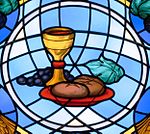
| Part of a series on the |
| Eucharist |
|---|
 |
| Part of a series on |
| Christianity |
|---|
 |
Mass is the main Eucharistic liturgical service in many forms of Western Christianity. The term Mass is commonly used in the Catholic Church,[1] Western Rite Orthodoxy, Old Catholicism, and Independent Catholicism. The term is also used in many Lutheran churches,[2][3][4] as well as in some Anglican churches,[5] and on rare occasion by other Protestant churches.
Other Christian denominations may employ terms such as Divine Service or worship service (and often just "service"), rather than the word Mass.[6] For the celebration of the Eucharist in Eastern Christianity, including Eastern Catholic Churches, other terms such as Divine Liturgy, Holy Qurbana, Holy Qurobo and Badarak (or Patarag) are typically used instead.
- ^ John Trigilio, Kenneth Brighenti (2 March 2007). The Catholicism Answer Book. Sourcebooks, Inc.
The term "Mass", used for the weekly Sunday service in Catholic churches as well as services on Holy Days of Obligation, derives its meaning from the Latin term Missa.
- ^ DeGarmeaux, Mark E. (1995). "O Come, Let Us Worship! I. The Church Service II. The Church Song A Study in Lutheran Liturgy and Hymnody presented to the 78th Annual Convention of the Evangelical Lutheran Synod". Bethany Lutheran College. Retrieved 5 October 2024.
The basic structure of the Western liturgy is generally called the Mass, even in Lutheran countries. Our Scandinavian brothers and sisters still use the term High Mass (Høimesse) for the Communion Service. Luther called his two services: the German Mass and the Formula of the Mass. Bach and other Lutheran composers (such as Hassler and Pedersøn) wrote masses or parts of masses for use in Lutheran churches. Other Lutheran composers who wrote works for use within the Divine Service include Walter, Schütz, Scheidt, Schein, Buxtehude, Pachelbel, Praetorius, Walther, Telemann, Zachau, Mendelssohn, Brahms, Bender, Distler, Pepping, Micheelsen, Nystedt, and many others.
- ^ "Article XXIV (XII): Of the Mass". Book of Concord. Archived from the original on 1 July 2014. Retrieved 7 January 2020.
- ^ Joseph Augustus Seiss (1871). Ecclesia Lutherana: a brief survey of the Evangelical Lutheran Church. Lutheran Book Store.
Melancthon, the author of the Augsburg Confession, states, that he uses the words Mass and the Lord's Supper as convertible terms: 'The Mass, as they call it, or, with the Apostle Paul, to speak more accurately, the celebration of the Lord's Supper,' &c. The Evangelical Princes, in their protest at the Diet of Spires, April 19th, 1529, say, 'Our preachers and teachers have attacked and utterly confuted the popish Mass, with holy, invincible, sure Scripture, and in its place raised up again the precious, priceless SUPPER OF OUR DEAR LORD AND SAVIOUR JESUS CHRIST, which is called THE EVANGELICAL MASS. This is the only Mass founded in the Scriptures of God, in accordance with the plain and incontestable institution of the Saviour.'
- ^ Seddon, Philip (1996). "Word and Sacrament". In Bunting, Ian (ed.). Celebrating the Anglican Way. London: Hodder & Stoughton. p. 100.
- ^ Brad Harper, Paul Louis Metzger (1 March 2009). Exploring Ecclesiology. Brazos Press. ISBN 9781587431739.
Luther also challenged the teaching that Christ is sacrificed at the celebration of the mass. Contrary to popular Protestant opinion, Magisterial Roman Catholic teaching denies that Christ is, in the Mass, sacrificed time and time again. According to The Catechism of the Catholic Church, 'The Eucharist is thus a sacrifice because it re-presents (makes present) the sacrifice of the cross, because it is its memorial and because it applies its fruit.'
